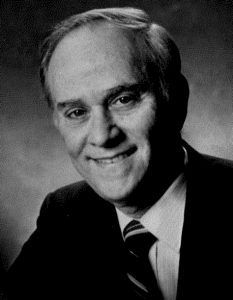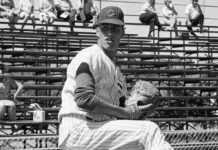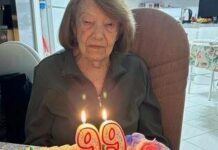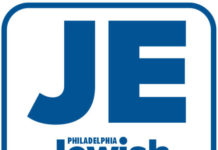
Rabbi Henry Cohen, who served at Beth David Reform Congregation for nearly 30 years and was a longtime social justice activist, died June 18. He was 93.
Rabbi Beth Kalisch, the current rabbi at Beth David, said Cohen was among a vanguard of rabbis pushing for social justice issues at a time when that wasn’t common.
“A primary expression of Judaism today is standing up for others,” she said. “We owe a big debt of gratitude to Rabbi Cohen.”
“I believe the main function of a rabbi is to teach Judaism. The question is, ‘How do you teach?’”, he said in a 1993 Jewish Exponent article about his pending retirement. “To me, teaching Judaism is bringing values of Judaism into people’s lives. How do you do that? Not by telling little Chasidic tales” but “by creating a community where those values are lived.”
The Houston native was born into a family of reform rabbis who set the tone for Cohen’s activism. Cohen’s grandfather, also named Henry, was the only rabbi on a 1930 list The New York Times published, by prominent Rabbi Stephen S. Wise, of “the ten foremost religious leaders in this country.”
Cohen graduated from the University of Texas, then was ordained at Hebrew Union College. After a stint as an Army chaplain, he served as an assistant rabbi in Great Neck, New York, and met his late wife Edna.
Cohen next moved to Champaign-Urbana, Illinois, receiving a master’s degree in the philosophy of education and serving a congregation there.
But Cohen sought more diversity and moved to Philadelphia in 1964 to lead Beth David — then one of only three Reform congregation in the area, according to the 1993 Exponent article — which was then located in Philadelphia’s racially mixed Wynnefield neighborhood, daughter Lisa Cohen said. It was something his grandfather might do.
“He was most proud of being his grandfather’s legacy,” she said.
“That history gave him the strength of conviction to know that people wouldn’t always agree with him … but he knew that what he had to do was right,” Kalisch said. “Everyone described him as a person of deep integrity who really walked the walk.”
Over the next couple of decades, Henry Cohen demonstrated his interest in social justice, Lisa Cohen said. Accomplishments included creating a Black-Jewish nursery school; chairing the Jewish Coalition for Peace; being part of an interfaith clergy group that visited Israel, Lebanon and Jordan in 1974; and visiting refuseniks in the Soviet Union in 1986, then successfully campaigning for the release of Beth David’s then-Cantor Lilia Kazansky’s parents.
Lisa Cohen said her father was always thinking about his place in the world and making things better.
“Every night, we would watch the news while we were eating dinner, and there was always discussion,” she said, noting that those lessons helped propel her to a career in social work. “He would ask, ‘What do you think?’ He wanted us to think and look at the world.”
In the 1970s, Beth David sponsored several Laotian “boat people,” and Cohen was in the forefront in helping them get settled in the United States.
“That opened my eyes up to the wider world,” Lisa Cohen said.
Kalisch noted that Cohen was an activist in speaking out against the Vietnam War and was open to both interfaith and LGBTQ inclusion ahead of his time, as well as civil rights. As a rabbinical student in the 1950s, he organized protests of a Woolworth’s lunch counter in Cincinnati, Kalisch said.
Cohen’s interest in civil rights made Beth David’s decision to relocate to Gladwyne in the mid-1980s troubling for him, Kalisch said. She said he likely was the last congregant still living in Wynnefield.
Cohen also was prolific as an author. His works included a biography of his grandfather and “Charley Braunstein and Jewish Tradition,” a take-off on Charles Schulz’s “Peanuts” characters.
While serious about social justice and Judaism, Cohen displayed a softer side to the congregation with his “Charley Braunstein” stories and silly songs tied to holidays and Jewish tradition, and to his family with lesser-known passions, Lisa Cohen said.
“My dad was an avid sports fan,” she said, adding that they used to play baseball in the backyard, and his attempt to ride a skateboard resulted in a broken ankle. “He prayed for the Phillies.”
When it came time for his developmentally disabled daughter, Shelley, to have her bat mitzvah, Cohen wasn’t deterred.
“He said, ‘We’re going to do something that works for her,’” Lisa Cohen said, also remembering the time he performed a funeral service for a neighbor girl’s hamster.
After retiring in 1993, Cohen was active in various groups and a strong supporter of Ben-Gurion University, but an early diagnosis of dementia eventually limited him, Lisa Cohen said.
Cohen is survived by his daughters, Shelley and Lisa, and a granddaughter.
[email protected]; 215-832-0797







I remember so well your late father, Henry Cohen. I owned a bookstore in Wynnewood at the rime he was a Rabbi at Beth David. My brother and sister in law were devoted friends of his and I attended many services he conducted. When he learned that I had a bookstore he asked me to to participate in several Oneg Shabats at Beth David. We shared some wonderful moments discussing the passage of my grandmother from her village in Russia to her husband who had come to Philadelphia earlier to escape the Russian brutality.
Our family admired and participated in the anti war movement that your beloved father engaged in. My sympathies to you for bringing to light the memories I had of your father and his fight for justice.
Sincerely, Barbara Blum
[email protected]